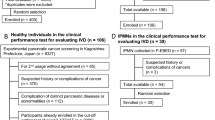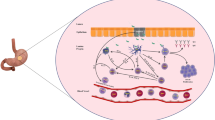Abstract
Due to high costs and limited availability of screening colonoscopy, some screening programs require a positive fecal occult blood test (FOBT) before screening colonoscopy is remunerated. As male sex is a strong predictor of adenoma and advanced adenoma, we evaluated whether a positive FOBT or male sex is a stronger risk factor for adenoma and advanced adenoma. FOBT and screening colonoscopy results from 18.665 consecutive patients participating in a “national health check program” between 2009 and 2011 were included in this cohort study. Age-corrected adenoma detection rates (ADR), advanced adenoma detection rates (AADR) and carcinoma detection rates were calculated for men and women according to FOBT result separately. ADR and AADR in FOBT-positive men (34.6 and 11.8 %) and FOBT-negative men (29.1 and 7.6 %) were higher than ADR and AADR in FOBT-positive women (20 and 6.9 %) and in FOBT-negative women (17.6 and 4.4 %), (p = 0.0003). Men with negative FOBT were at higher risk of having an adenoma and advanced adenoma than women with positive FOBT (p < 0.0001). Odds ratios of a positive FOBT for ADR and AADR were 1.3 (1.1–1.5) (p = 0.0047) and 1.6 (1.2–2.1) (p < 0.0001), respectively. Odds ratios of male sex to predict ADR and AADR were significantly higher with 1.9 (1.8–2.1) and 1.8 (1.6–2), respectively (p < 0.001). Male sex is a stronger predictor for colorectal adenoma and advanced adenoma than positive FOBT. These results should be taken into account analyzing FOBT-based screening programs.


Similar content being viewed by others
References
Zauber AG, Winawer SJ, O’Brien MJ, Lansdorp-Vogelaar I, van Ballegooijen M, Hankey BF, et al. Colonoscopic polypectomy and long-term prevention of colorectal-cancer deaths. N Engl J Med. 2012;366(8):687–96.
Lebwohl B, Capiak K, Neugut AI, Kastrinos F. Risk of colorectal adenomas and advanced neoplasia in Hispanic, black and white patients undergoing screening colonoscopy. Aliment Pharmacol Ther. 2012;35(12):1467–73.
Gupta S, Saunders BP, Fraser C, Kennedy RH, Ignjatovic A, Sala S, et al. The first 3 years of national bowel cancer screening at a single UK tertiary centre. Colorectal Dis. 2012;14(2):166–73.
http://www.cancerscreening.nhs.uk/bowel/publications/bowel-cancer-the-facts.pdf
Klabunde CN, Lanier D, Nadel MR, McLeod C, Yuan G, Vernon SW. Colorectal cancer screening by primary care physicians: recommendations and practices, 2006–2007. Am J Prev Med. 2009;37(1):8–16.
Hundt S, Haug U, Brenner H. Comparative evaluation of immunochemical fecal occult blood tests for colorectal adenoma detection. Ann Intern Med. 2009;150(3):162–9.
Morikawa T, Kato J, Yamaji Y, Wada R, Mitsushima T, Shiratori Y. A comparison of the immunochemical fecal occult blood test and total colonoscopy in the asymptomatic population. Gastroenterology. 2005;129(2):422–8.
Levi Z, Rozen P, Hazazi R, Vilkin A, Waked A, Maoz E, et al. A quantitative immunochemical fecal occult blood test for colorectal neoplasia. Ann Intern Med. 2007;146(4):244–55.
Haug U, Hundt S, Brenner H. Quantitative immunochemical fecal occult blood testing for colorectal adenoma detection: evaluation in the target population of screening and comparison with qualitative tests. Am J Gastroenterol. 2010;105(3):682–90.
Shaukat A, Mongin SJ, Geisser MS, Lederle FA, Bond JH, Mandel JS, et al. Long-term mortality after screening for colorectal cancer. N Engl J Med. 2013;369(12):1106–14.
Ferlitsch M, Reinhart K, Pramhas S, Wiener C, Gal O, Bannert C, et al. Sex-specific prevalence of adenomas, advanced adenomas, and colorectal cancer in individuals undergoing screening colonoscopy. JAMA. 2011;306(12):1352–8.
Regula J, Rupinski M, Kraszewska E, Polkowski M, Pachlewski J, Orlowska J, et al. Colonoscopy in colorectal-cancer screening for detection of advanced neoplasia. N Engl J Med. 2006;355(18):1863–72.
Hoffmeister M, Schmitz S, Karmrodt E, Stegmaier C, Haug U, Arndt V, et al. Male sex and smoking have a larger impact on the prevalence of colorectal neoplasia than family history of colorectal cancer. Clin Gastroenterol Hepatol. 2010;8(10):870–6.
Hassan C, Pickhardt PJ, Kim DH, Di Giulio E, Zullo A, Laghi A, et al. Systematic review: distribution of advanced neoplasia according to polyp size at screening colonoscopy. Aliment Pharmacol Ther. 2010;31(2):210–7.
Royston PAD. Regression using fractional polynomials of continuous covariates: parsimonious parametric modeling. Appl Stat. 1994;43(3):429–67.
Ambler GBA. The mfp package. Vienna: R Foundation for Statistical Computing; 2010.
Haug U, Kuntz KM, Knudsen AB, Hundt S, Brenner H. Sensitivity of immunochemical faecal occult blood testing for detecting left- vs right-sided colorectal neoplasia. Br J Cancer. 2011;104(11):1779–85.
Steele RJ, McClements PL, Libby G, Black R, Morton C, Birrell J, et al. Results from the first three rounds of the Scottish demonstration pilot of FOBT screening for colorectal cancer. Gut. 2009;58(4):530–5.
Kolligs FT, Crispin A, Munte A, Wagner A, Mansmann U, Goke B. Risk of advanced colorectal neoplasia according to age and gender. PLoS One. 2011;6(5):e20076.
Lieberman DA, Prindiville S, Weiss DG, Willett W. Risk factors for advanced colonic neoplasia and hyperplastic polyps in asymptomatic individuals. JAMA. 2003;290(22):2959–67.
Ng SC, Ching JY, Chan V, Wong MC, Suen BY, Hirai HW, et al. Diagnostic accuracy of faecal immunochemical test for screening individuals with a family history of colorectal cancer. Aliment Pharmacol Ther. 2013;38(7):835–41.
Rozen P, Levi Z, Hazazi R, Waked A, Vilkin A, Maoz E, et al. Quantitative colonoscopic evaluation of relative efficiencies of an immunochemical faecal occult blood test and a sensitive guaiac test for detecting significant colorectal neoplasms. Aliment Pharmacol Ther. 2009;29(4):450–7.
Acknowledgments
We would like to thank all participants of the project for their support and data input. A list of contributing endoscopists is available online at www.vorsorgekoloskopie.at and www.krebshilfe.net. We would like to thank Josef Probst, PhD from Austrian Federation of the Statutory Insurance Institutions, Vienna, Austria, for his support in the organization. The project “Quality certificate for screening colonoscopy” was conducted in cooperation with the Main Association of Austrian Social Security Institutions and funded by fund § 447h ASVG (Fund for preventive checkups and health promotion).
Conflict of interest
None.
Author information
Authors and Affiliations
Corresponding author
Additional information
On behalf of the Quality Assurance Working Group (see acknowledgement for Weblink to detailed list).
The Corresponding Author has the right to grant on behalf of all authors and does grant on behalf of all authors, an exclusive license (or non-exclusive for government employees) on a worldwide basis to the BMJ Publishing Group Ltd to permit this article (if accepted) to be published in BMJ editions and any other BMJPGL products and sublicenses such use and exploit all subsidiary rights, as set out in our license.
Rights and permissions
About this article
Cite this article
Ferlitsch, M., Heinze, G., Salzl, P. et al. Sex is a stronger predictor of colorectal adenoma and advanced adenoma than fecal occult blood test. Med Oncol 31, 151 (2014). https://doi.org/10.1007/s12032-014-0151-0
Received:
Accepted:
Published:
DOI: https://doi.org/10.1007/s12032-014-0151-0




